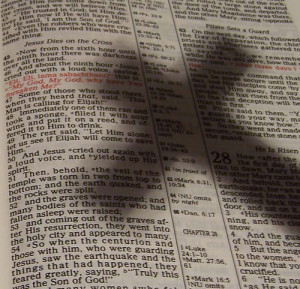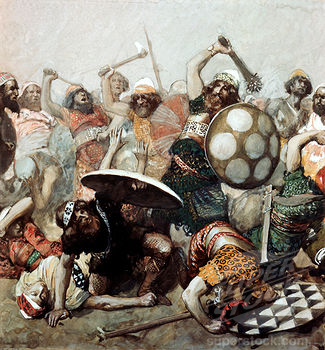 As we try to understand the theology behind the idea that on the cross, Jesus reveals to us what God was doing in the Old Testament, we are in a section where we recognize that there are no “pat answers” to the problem of evil in the world, and that the situation is much more complex than most of us realize. I have about six points to a “Chaos Theory” which help us understand why bad things happen in this world.
As we try to understand the theology behind the idea that on the cross, Jesus reveals to us what God was doing in the Old Testament, we are in a section where we recognize that there are no “pat answers” to the problem of evil in the world, and that the situation is much more complex than most of us realize. I have about six points to a “Chaos Theory” which help us understand why bad things happen in this world.
In a previous post I suggested that God has a policy of non-intervention. In this post I want to emphasize that I am not presenting the “deist” view of God. I do not think that God is the cosmic clock maker who wound the gears of the universe to get things started and then left us to our own devices. The fact of God’s policy of non-intervention does not mean that God is off playing golf somewhere while we struggle on our own with wars, tornadoes, and terrorism. No, God is intimately involved in our daily lives, but this first point of the chaos theory simply argues that God is such a believer in having true relationships with His creatures, that He gave us true and genuine freedom within creation, so that we can choose to love and serve Him (or not).
Does this mean then that God does not act upon creation at all?
No! Quite to the contrary, God is extremely active.
God Woos Us
Like a lover, He calls and woos us to follow Him and His ways. He nudges, winks, and whispers. He paints pictures and writes poems. He invites us to imagine things differently than they are, and in so imagining, invites us to join with Him in helping our imagination become reality.
This process of thinking about the future with a divinely inspired imagination and then working with God to bring our imagination into reality is called The Prophetic Imagination by theologian and Bible scholar Walter Brueggemann. One of the reasons God gave us freedom and liberty is so that we could work with Him in bringing His rule and reign on the earth.
Prayer Invites God to Intervene
Prayer also is one of the means by which God has allowed us to change events. Sometimes God wants to act in a certain way, but the lack of prayer restricts His actions.




 I
I  And let me tell you, he NAILED it. He basically said the same thing I have been saying in my series on this blog.
And let me tell you, he NAILED it. He basically said the same thing I have been saying in my series on this blog.
 Before we can look at specific Bible passages regarding the violence of God in Scripture, it is important to develop a framework which helps us understand what is going on within and behind these violent texts. I have six points of this framework, which I call “
Before we can look at specific Bible passages regarding the violence of God in Scripture, it is important to develop a framework which helps us understand what is going on within and behind these violent texts. I have six points of this framework, which I call “
 So before we look at any specific passages, I want to briefly present a framework for how to understand what is going on behind many of the violent and destructive passages in Scripture. In this post I will present the basic framework, and in the following couple of posts I will present what I call the “Six Principles of Chaos Theory.” Only then will be well prepared to begin looking at some of the violent texts of Scripture to see how they do not reveal a violent and bloody God, but a God that looks surprisingly like Jesus Christ.
So before we look at any specific passages, I want to briefly present a framework for how to understand what is going on behind many of the violent and destructive passages in Scripture. In this post I will present the basic framework, and in the following couple of posts I will present what I call the “Six Principles of Chaos Theory.” Only then will be well prepared to begin looking at some of the violent texts of Scripture to see how they do not reveal a violent and bloody God, but a God that looks surprisingly like Jesus Christ. Thankfully, this is not the God that created the world, nor is it the God portrayed in Scripture, nor especially is it the God revealed in Jesus Christ. The true God, the God who created heaven and earth, the God of Abraham, Isaac, and Jacob, the God who raised up Kings and Prophets in Israel to carry His message, the God ultimately revealed in Jesus Christ, and carried now by the Spirit through His Church, is a God of infinite love, mercy, compassion, forgiveness, long-suffering, patience, kindness, and grace. This is the God who desires a relationship with each person on earth.
Thankfully, this is not the God that created the world, nor is it the God portrayed in Scripture, nor especially is it the God revealed in Jesus Christ. The true God, the God who created heaven and earth, the God of Abraham, Isaac, and Jacob, the God who raised up Kings and Prophets in Israel to carry His message, the God ultimately revealed in Jesus Christ, and carried now by the Spirit through His Church, is a God of infinite love, mercy, compassion, forgiveness, long-suffering, patience, kindness, and grace. This is the God who desires a relationship with each person on earth. An analogy might be helpful. You probably remember the scene from “Jurassic Park” where the wild-eyed scientist, Dr. Ian Malcom, talks about “chaos theory” and illustrates it by watching drops of water roll off his knuckle. He shows that even though the drop of water lands in the same place each time, it rarely goes in the same direction.
An analogy might be helpful. You probably remember the scene from “Jurassic Park” where the wild-eyed scientist, Dr. Ian Malcom, talks about “chaos theory” and illustrates it by watching drops of water roll off his knuckle. He shows that even though the drop of water lands in the same place each time, it rarely goes in the same direction. How can a God who says "Love your enemies" (Matthew 5:44) be the same God who instructs His people in the Old Testament to kill their enemies?
How can a God who says "Love your enemies" (Matthew 5:44) be the same God who instructs His people in the Old Testament to kill their enemies?

 This is a summary post from much of what I have been writing over the past two weeks or so about the violence of God in the Old Testament. The reason I am summarizing it is because I want to begin looking at some of the key biblical passages which are affected by my proposal to see how we can read and understand these texts.
This is a summary post from much of what I have been writing over the past two weeks or so about the violence of God in the Old Testament. The reason I am summarizing it is because I want to begin looking at some of the key biblical passages which are affected by my proposal to see how we can read and understand these texts.